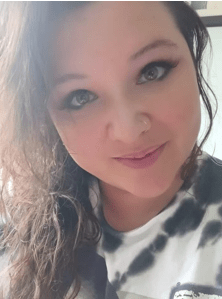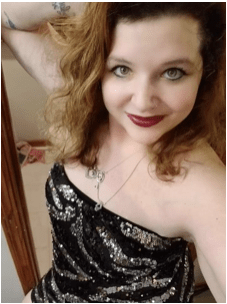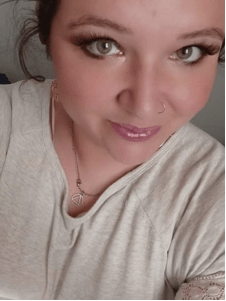
In middle school, 37-year-old Charleston resident, Rachel Golden, dreamed of becoming an aviation lawyer.
From the outside looking in, she was the kind of child any parent or teacher would consider bright and full of potential. Rachel made good grades, behaved well, and never showed signs that she’d experience anything other than success in future endeavors.
Despite these traits, Rachel had one kryptonite – the weight of others’ opinions.
“I was super sweet, but I never felt like I truly fit in,” says Rachel. “I always cared what others thought about me. I just wanted to be accepted andliked, and I never truly felt good enough.”
Rachel’s long fall from the pedestal
Once she entered high school, Rachel signed on with a technical school where she completed two years of aviation maintenance.
“By the time I completed high school, I could build jet engines,” says Rachel.
She went on to study forensic psychiatry at West Virginia University. Despite achieving milestones far beyond those of her peers, Rachel still felt she didn’t belong.
She couldn’t “achieve” her way to feeling worthy, and so she found it in something else.
“College was filled with parties, and I wanted to feel accepted and liked,” says Rachel. “So I started throwing parties to have friends, and that’s where my addiction began.”

Drugs offered a “sense of belonging,” until they didn’t.
Rachel started experimenting with prescription pain medication during her first year of college. By her third year, she was failing out due to full-blown addiction.
“I had a five hundred dollar a day habit,” reflects Rachel. “Doctors were essentially my drug dealers. I would get a script for pain, then sell them to get more powerful prescription drugs.”
Looking back, Rachel didn’t know many people in her life who weren’t taking advantage of the same opportunity to obtain pain pills. It was easy to walk in to a doctor’s office and walk out minutes later with a script for highly addictive opioids.
“The addiction began with having doctors prescribe these highly addictive opiates, and the fact that I liked to take them,” says Rachel. “I think they made these drugs too accessible and too easy to get. Almost everyone I ever knew was getting them or could get them.”
Addiction consumed Rachel’s life. Drugs were the center of her friendships, activities, and lifestyle.
“They [the drugs] were at every party, every school event, and in everyone’s medicine cabinets,” remembers Rachel. “The fact that I liked to get high, and with it being easy to get, set my addiction into full swing.”
A full-time job of staying high
Rachel’s middle school dreams quickly shattered and were replaced by the pursuit of the next high.
“Soon my full-time job was staying as high as possible at all times,” says Rachel. “Everything I had ever wanted just went down the drain.”
Rachel was not only addicted to opioids, but also the fast-paced, high paying lifestyle that came with it.
“The drugs brought forth a sense of belonging,” says Rachel. “Nothing mattered to me that did not involve drugs. I liked the power and control that I thought I had. I thought that I was untouchable.”
While Rachel believed the drugs gave her friendships and a sense of belonging, she realizes years later that those beliefs were untrue.
“I never had true connections with people because I was living a lie that I thought I had to hide from everyone,” says Rachel. “I would often lie to the people that I cared about the most.”
Rachel felt she needed opioids to function in all areas of her life. She isolated herself from loved ones and stuck close with those who supported her addiction.
“I missed out on a lot of family events because the drugs made me want to isolate myself,” says Rachel. “I never really had real friends until I got sober. I thinkif I wasn’t using drugs, my whole circle of friends would have probably been different.”
Opioids brough death, loss, and heartache.
As Rachel fell deeper into addiction, she depended on pills to function through every aspect of life. They numbed her emotions and prevented her from feeling physical or emotional pain.
“If I was happy, I wanted to get high and if I was sad, I wanted to get high,” says Rachel. “It just took complete control over everyaspect of my life. I needed a pill for any type of feeling I washaving. I was completely chemically dependent.”
As time went on, addiction continued to steal Rachel’s time, health, and loved ones. She suffered through the deaths of friends and loved ones who succumbed to the disease of addiction.
Years after her first husband died from a drug overdose, she was arrested and handed a jail sentence —a turning point in her life that became a “blessing in disguise”.
Through the darkness, Rachel saw clearly it was time for change.
“I knew I was ready to get sober when I was in jail,” says Rachel. “I came off all the drugs while I was incarcerated. My mind grew clearer and clearer, and I knew that I needed help.”
She entered rehab and began working at a 12-step rehabilitation program. There, she continues to work on her sobriety and helps others who are still suffering through addiction.
“I decided that this was always what I was meant to do,” says Rachel. “It keeps me sober to help other people who are still suffering, and it reminds me where I came from and how hard I worked to get to where I am today.”
Starting from the ground up
Rachel found the only way she could stay sober would be to remove everything from her life and start fresh. She cut ties with the people, places, and pills that kept her tethered to addiction.
“The only thing that works for me is complete abstinence,” says Rachel. “I’m not originally from Charleston, but I feel that’s why my program works for me. I stay away from people, places and things that are sobriety threatening. It’s hard to move away from everything you know, but I honestly believe I needed that to heal. I’m finding out who I am for thefirst time in many years. I like this new me, and I’m truly excited for my future.”
Rachel has been sober for one year and three months. With a short time left in transitional living, she’s looking forward to the future for the first time in years.
“’Life is so good now,” exclaims Rachel. “I wake up clear headed, and I have drive and ambition.I like to say that I eat, sleep, and breathe recovery, but that’s truly what it takes for me. My family always tells me they are so proud of me, and that feels really good to hear.”

Looking back, Rachel says awareness around the dangers of opioids and addiction as a disease would’ve benefited her as a child searching for connection. Organizations like GameChanger, she says, offer support for those who are considering experimenting with opioids or have found themselves at the crossroads of addiction.
“The largest thing is awareness, and I think we can truly show people that sobriety is possible,” says Rachel.
Drugs do not discriminate.
Rachel warns those who are prescribed pain medication, or those who have access to them without a prescription.
“Be careful—drugs do not discriminate,” she says. “You never know when the first time could be the last time. The drugs that are available today are so powerful, and it only takes a littlebit.”
She cautions others to learn about medications prescribed to them, and to discuss alternatives if possible.
“It’s a whole different ball game out there today,” she says. “If you’re prescribed them, proceed with caution.That one pill can lead to a lifetime of death and destruction. Please consider all those things when taking that medication.”
Learn more about GameChanger
GameChangers’ Opioid and Substance Misuse Prevention Program was born out of collaboration between GameChanger and theHazelden Betty Ford Foundation. The mission leans on student-peer leadership to encourage children to make smart, healthy decision about opioids, alcohol, and other substances.
To learn more or seek help, visitgamechangerusa.org.